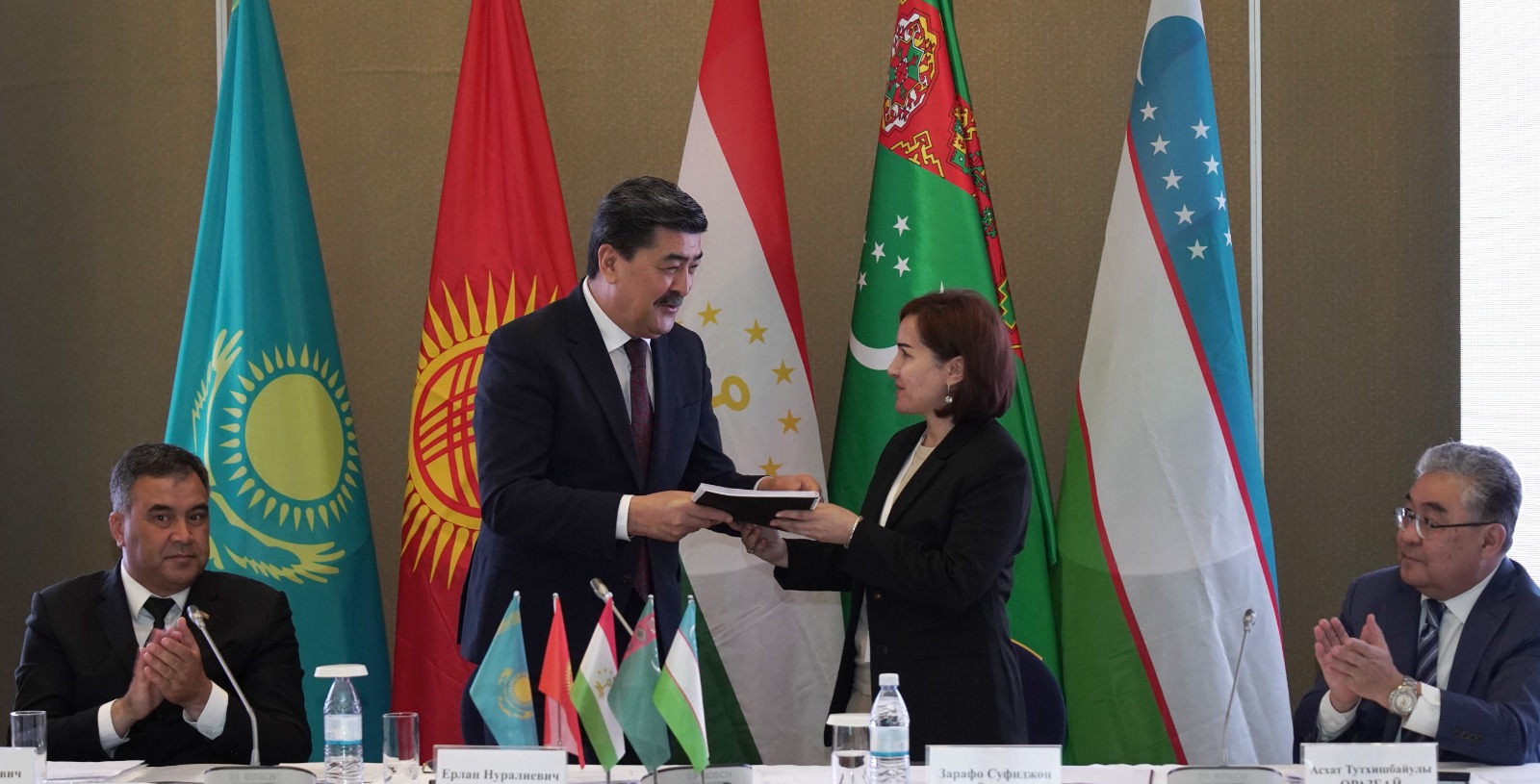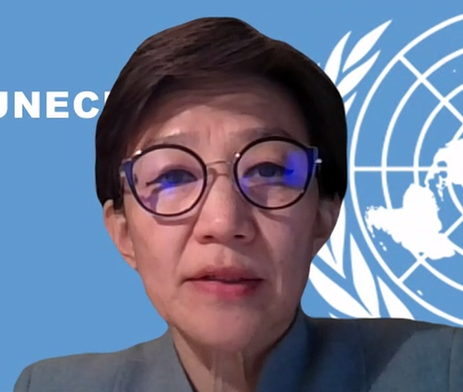“Central Asia faces serious challenges such as climate change, biodiversity loss, land degradation and shrinking water resources. While we realistically assess the severity of the problems, we are very well aware of a wide arsenal of tools to solve them. The experience of the Regional Environmental Centre for Central Asia shows that joint actions are more effective,” said Zafar Makhmudov, Executive Director of the Regional Environmental Centre for Central Asia (CAREC), at a meeting of the Interstate Commission on Sustainable Development of Central Asian Countries (ICSD) in Astana on March 28, 2024.
As successful examples, Zafar Makhmudov cited joint activities with the ICSD to prepare countries for the global negotiations at the UNFCCC COP26 and COP28, the holding of Central Asia Conferences on Climate Change, as well as upcoming the first meeting of the working group on the Regional Strategy for Adaptation to Climate Change in Central Asia, the launch of the third cycle of updating country NDCs by the NDC Secretariat at the CACCC-2024, and a number of other significant events at the regional level.
The meeting took stock of the ICSD. As the Chairman of the ICSD and Minister of Ecology and Natural Resources of the Republic of Kazakhstan, Yerlan Nysanbayev, noted, the Commission aims at achieving economic and environmental goals.
ICSD is working to implement the Regional Programme on Environmental Protection for Sustainable Development of Central Asia, adopted in 2022, as well as to expand cooperation and partnerships at all levels to contribute to the implementation of internationally agreed water-related goals and targets, including those of the 2030 Agenda for Sustainable Development.
As noted, the ICSD copes with challenging tasks and works on the rational and efficient use of natural resources, especially transboundary ones, based on the norms of international law and experience, as well as implements climate policy for low-carbon development and adaptation to climate change, promotes green business and green technologies and creates international principles for the transfer of environmentally friendly technologies.
During the meeting, a ceremony was held to transfer the chairmanship of the ICSD from the Republic of Kazakhstan to the Republic of Tajikistan. Recall that Kazakhstan headed the ICSD from 2022 to 2024. The chairmanship of Tajikistan will last until 2026.

Chairman of the Executive Committee of the International Fund for Saving the Aral Sea (EC IFAS) Askhat Orazbay noted the significance of the meeting.
“Today, Kazakhstan is handing over the chairmanship of the ICSD to our fraternal state of Tajikistan. As you know, three months ago, Kazakhstan, in turn, took over the chairmanship of the International Fund for Saving the Aral Sea from Tajikistan. It shows that everything is intertwined in our region, and all the structures operating in Central Asia are very close to each other. You know that last year we celebrated the 30th anniversary of IFAS, and this year we will celebrate the 30th anniversary of ICSD,” Askhat Orazbay said.
First Deputy Chairman of the Committee for Environmental Protection under the Government of the Republic of Tajikistan (CEP RT) Zarafo Kiyomzoda
drew attention to the fact that the meeting of the ICSD confirms the joint desire of intergovernmental structures and international organizations to solve environmental problems of the region. Over the past years, the ICSD has begun to improve the institutional and legal framework for identifying priority areas for the development of regional cooperation.
According to the Deputy Minister of Environmental Protection of Turkmenistan Begench Miminov, over the past years, this is IFAS and ICSD have played a significant role in building dialogue and cooperation to solve economic and socio-economic problems caused by the drying up of the Aral Sea.
“The Aral Sea problem has gone far beyond the borders of our region and has become a truly global problem that requires the same global response,” Begench Miminov emphasized.
He noted that Turkmenistan supports the implementation of specific initiatives of the IFAS founding countries aimed at intensifying regional cooperation and forming systemic mechanisms for collaboration in environmental protection and sustainable development in the Central Asia region.
“Our common goal is to create a harmonious, sustainable and long-term system of cooperation based on ensuring the interests of the countries of our region, the well-being of the peoples living here, their health, development and progress,” Begench Miminov said.
Head of the Secretariat of the Ministry of Ecology, Environmental Protection and Climate Change of the Republic of Uzbekistan Utkir Zhumanov
noted that in Uzbekistan, the principles of green growth, the development of renewable energy sources, the development of environmentally friendly transport, and the increase in green areas for sustainable development in harmony with nature are priorities. Massive planting of forests and plants on the exposed bottom of the Aral Sea of more than two million hectares reduces dust and salt storms.
“Thanks to the political will of the heads of state of the Central Asian countries, all opportunities are being created to implement regional initiatives, especially those aimed at improving economic, environmental and social stability,” Utkir Zhumanov emphasized.
Head of the United Nations Environment Programme (UNEP) Sub-Regional Office for Central Asia Aidai Kurmanova also stressed the importance of regional cooperation. She noted that UNEP is interested in cooperation with the countries of the Central Asian region and intends to implement the decisions taken at the global level of the organization through concrete practical actions in addition to what is already being implemented in the region today.
 UNECE Regional Adviser on Environment Sarangoo Radnaaragchaa
reported that UNECE regularly supports Central Asian countries in strengthening their water and environmental management capacities.
UNECE Regional Adviser on Environment Sarangoo Radnaaragchaa
reported that UNECE regularly supports Central Asian countries in strengthening their water and environmental management capacities.
“Our support is aimed at promoting sustainable development and addressing the urgent challenges of climate change, water scarcity and environmental degradation,” said Sarangoo Radnaaragchaa.
Marat Asanaliev, Deputy Director of the GIZ Regional Programme on Integrative and Climate-Sensitive Land Use in Central Asia, believes that the ICSD is a good platform for dialogue, which is important to use to the fullest to achieve the objectives of the regional agenda.
He informed that the GIZ initiative “Green Central Asia” currently includes about ten national and regional projects. The initiative covers water management, green economy, climate change adaptation, land use and biodiversity management.
First Deputy Chair of the CEP RT Zarafo Kiyomozoda informed about the work plans of the ICSD for 2024-2026 under the chairmanship of the Republic of Tajikistan. All participants expressed gratitude to UNEP, GIZ, OSCE, EU and other international organizations for their contribution and assistance in solving environmental issues.
The ICSD meeting was organized by the Ministry of Ecology and Natural Resources of the Republic of Kazakhstan with the support of GIZ, IFAS, UNEP and CAREC.

Zhanna Husainova
Photo: Ministry of Ecology and Natural Resources of the Republic of Kazakhstan
